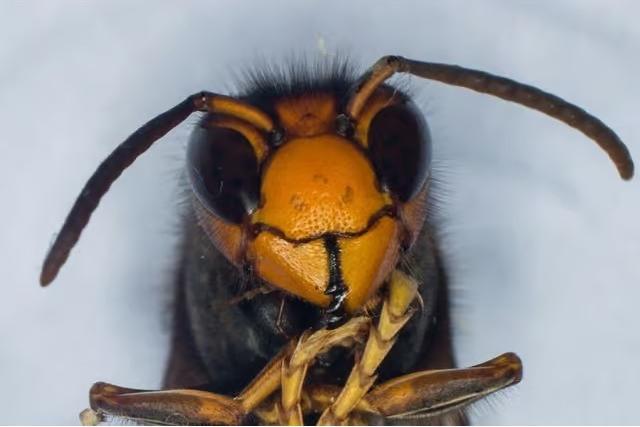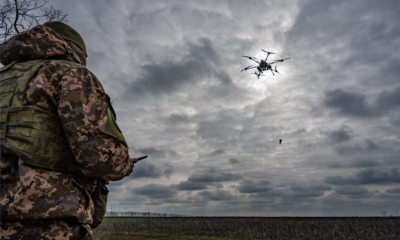Health
First Asian Hornet Sighting Sparks Urgent Warning in Northern Ireland

The first confirmed sighting of the Asian hornet in Northern Ireland has prompted an urgent warning from local authorities. This invasive species, known for its potential to disrupt local ecosystems and pose risks to public health, was spotted in September 2023, raising alarms among environmental and agricultural agencies.
The Department of Agriculture, Environment and Rural Affairs (DAERA) issued a public advisory following the discovery, urging residents to remain vigilant. The Asian hornet, which originates from Asia, has been spreading across Europe and poses significant threats to native bee populations, impacting biodiversity and agricultural productivity.
Details of the Sighting
The hornet was identified in the vicinity of Northern Ireland, marking the first instance of this species in the region. Officials are particularly concerned about the hornet’s aggressive nature and its capacity to harm both honeybees and other pollinators. As such, DAERA has outlined steps for the public to take if they suspect they have seen the hornet.
Residents are advised to report any sightings immediately, providing clear descriptions or photographs to assist in identification. This proactive approach aims to control the spread of the species before it establishes a foothold in the local ecosystem.
Potential Risks and Control Measures
The Asian hornet is notorious for its predatory behavior, particularly towards honeybees, which are crucial for pollination. A single hornet can kill multiple bees in a short time, jeopardizing local beekeeping operations and agricultural yields. Experts warn that if left unchecked, this species could lead to significant declines in bee populations, with far-reaching consequences for both agriculture and natural ecosystems.
To combat this threat, DAERA is collaborating with local beekeepers and environmental organizations to monitor the situation. Surveillance measures and public education campaigns are key components of the strategy to manage the potential invasion. As part of these efforts, local beekeepers are encouraged to inspect their hives regularly and report any unusual activity.
Public Awareness and Response
Community awareness plays a vital role in the response to the Asian hornet’s presence. DAERA has initiated outreach programs to educate the public on identifying the hornet and understanding its impact. Information sessions and materials are being distributed to ensure that residents can contribute to monitoring and controlling the situation effectively.
The discovery of the Asian hornet in Northern Ireland serves as a reminder of the growing challenges posed by invasive species globally. As migration patterns change and climate conditions evolve, the risk of similar occurrences increases, necessitating a coordinated response from both authorities and the public.
In light of this incident, officials emphasize the importance of reporting sightings and remaining informed about the threats posed by invasive species. The successful management of such situations hinges on collaboration and vigilance from all sectors of the community.
-

 World2 weeks ago
World2 weeks agoCoronation Street’s Shocking Murder Twist Reveals Family Secrets
-

 Entertainment1 week ago
Entertainment1 week agoAndrew Pierce Confirms Departure from ITV’s Good Morning Britain
-

 Entertainment5 months ago
Entertainment5 months agoKate Garraway Sells £2 Million Home Amid Financial Struggles
-

 Entertainment4 months ago
Entertainment4 months agoAnn Ming Reflects on ITV’s ‘I Fought the Law’ Drama
-

 Entertainment1 month ago
Entertainment1 month agoCoronation Street Fans React as Todd Faces Heartbreaking Choice
-

 Health4 months ago
Health4 months agoKatie Price Faces New Health Concerns After Cancer Symptoms Resurface
-

 World1 month ago
World1 month agoBailey Announces Heartbreaking Split from Rebecca After Reunion
-

 Entertainment2 weeks ago
Entertainment2 weeks agoTwo Stars Evicted from I’m A Celebrity Just Days Before Finale
-

 World2 weeks ago
World2 weeks agoKevin Sinfield Exceeds Fundraising Goal Ahead of Final Marathons
-

 Entertainment4 months ago
Entertainment4 months agoCoronation Street’s Carl Webster Faces Trouble with New Affairs
-

 Entertainment4 months ago
Entertainment4 months agoWhere is Tinder Swindler Simon Leviev? Latest Updates Revealed
-

 Entertainment5 months ago
Entertainment5 months agoMarkiplier Addresses AI Controversy During Livestream Response





















